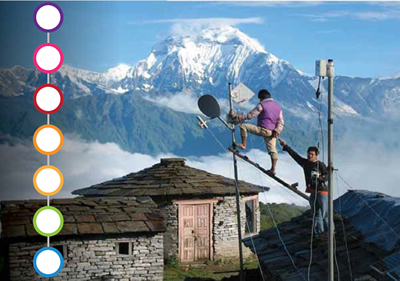Digital Innovator Series: Talking E-Commerce in Nepal with Sastodeal
This post is one of a series of posts on Digital Innovator.
Aug 20, 2020
We recently spoke with Amun Thapa, founder and CEO of Sastodeal.com about Nepal’s growing e-commerce sector, the impact of COVID-19, and the company’s inclusive business model. This is an excerpt of that interview.
Q: E-commerce is a nascent sector in Nepal, yet its growth may be important to boosting the country’s economy. What role do you see Sastodeal playing?
A: “Not only does Nepal have very challenging geography compared to most countries; from the mountain regions to the hills, and the flatlands, the entire country is largely dependent on the capital city of Kathmandu for supplies. As a result, e-commerce companies like Sastodeal play a crucial role in connecting businesses and consumers across the country.
“[Small and medium enterprises] across Nepal have unique regional resources and products. However, they do not have the capacity or internet accessibility to promote their products. For example, Yak cheese and honey from the mountain regions are precious and abundant and demand is soaring. However, entrepreneurs in those rural areas can’t reach the global market, let alone the local Nepali market outside their hyper-local area.
“Sastodeal immediately solves this problem by connecting rural entrepreneurs to buyers across the nation and vice versa. We’re looking into ways to promote these unique products globally. [Small and medium enterprises] in Nepal have the potential to contribute at least 30 to 40 percent of national GDP. However, that number is not being realized because of a lack of e-commerce platforms like Sastodeal.”
Q: Can you tell us about your partnership with Women Human Right’s Nepal; what motivated you to pursue this partnership and how does it fit within Sastodeal’s broader commitment to gender and social inclusion?
A: “We believe in gender and social inclusion and in partnering with many companies and organizations to meet those goals. Women for Human Rights (WHR) is a reputed nongovernmental organization known in Nepal and globally for their work over the past 25 years. We knew partnering with them to help women entrepreneurs across the country would be the right thing to do.
“We intend to help women entrepreneurs, especially those from remote areas, promote their products and services. Through WHR, we identified groups of entrepreneurs from across the country and helped them promote their products more widely. We successfully piloted Phase I, but temporarily halted operations due to COVID-19 as it restricted our movement to those more rural areas.”
Q: Nearly 80 percent of Nepali people live in rural areas, landlocked between the Himalaya mountains, and the Indo-Gangetic plains. This makes it challenging to transport products across Nepal and internationally, what are your solutions to overcome these challenges?
A: “We currently cover an estimated 70 to 80 percent of the areas in terms of distribution with a mixed model of self-fulfillment and outsourced logistics. However, we are in a phase of building last-mile delivery centers across Nepal so that people in cities and rural areas outside Kathmandu can receive their products within one to three days compared to five to seven days at present. We’re also exploring ways to promote local products in global markets by partnering with companies and platforms like ours outside of Nepal.”

Photo courtesy of UNCTAD Nepal Rapid eTrade Readiness Assessment.
Q: What are some of the biggest regulatory challenges concerning e-commerce in Nepal? In an ideal world, what would the regulatory environment look like?
A: “From a regulatory perspective, there is a misunderstanding of the e-commerce marketplace business model. Platforms like ours work with other brands and their products, but consumers and regulators see these as Sastodeal’s products. This creates a hassle when dealing with damaged goods and other issues. There isn’t a clear policy on how the e-commerce marketplace works—who is liable for the product, consumer data, returns, and exchanges, etc.
“In my opinion, regulations should enable businesses, not disable them. In most frontier and emerging markets like Nepal, innovative and disruptive companies move fast, they don’t wait for laws to happen (which can take anywhere from a year to decades). As a result, companies like ours are always working in a gray area.”
Q: Nepal is largely a cash-based economy, has COVID-19 changed this? What impact is this having on your business?
A: “Yes, cash is king in Nepal, but things are changing. The younger generations have started to use more cashless payments like QR codes and card payments to scan and pay on delivery. This is a new phenomenon in Nepal and COVID-19 has certainly boosted the trend. Right now, less than 5 percent of our transactions are online, but we forecast that by 2025 at least 40 percent of our business will be through online payments. Alongside efforts of e-commerce companies like Sastodeal, this shift can also be attributed to efforts banks, online payment gateways, and wallet companies have put in to promote cashless transactions.”
Q: What other consumer behaviors do you see impacting the uptake of e-commerce in Nepal?
A: “COVID-19 has certainly boosted e-commerce. There is immense fear among consumers to avoid busy shopping malls. It has also forced new users (especially the older generation) to learn and use online shopping platforms. In addition, the government’s priority for a digital Nepal movement will boost the industry. Another factor comes from India, which has influence in Nepal. People frequently travel to India, consumers mostly watch Indian tv channels and movies, and they’re used to seeing advertisements from e-commerce companies in India. Seeing how consumers in India have shifted to online buying is certainly influencing consumers in Nepal.”